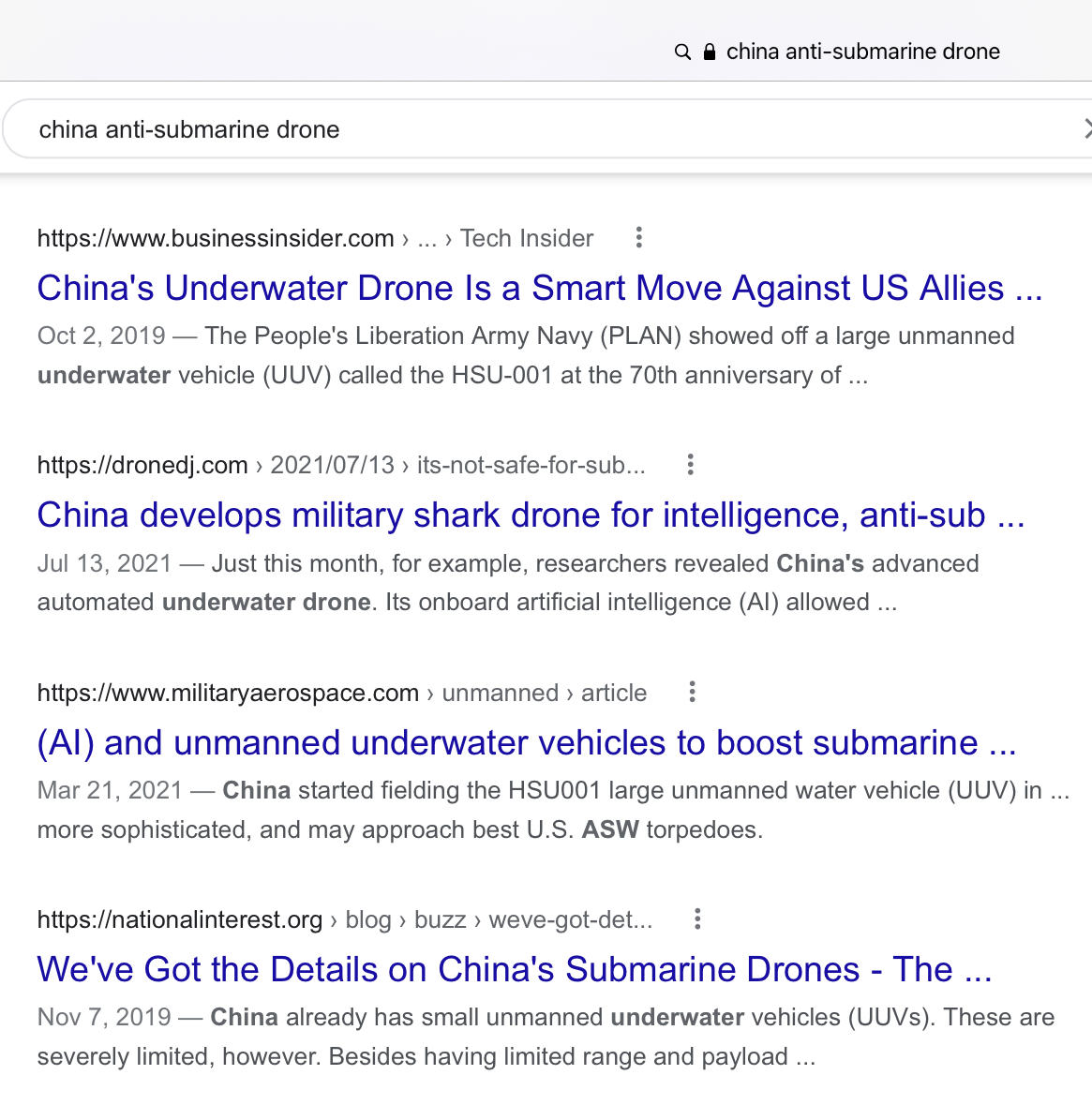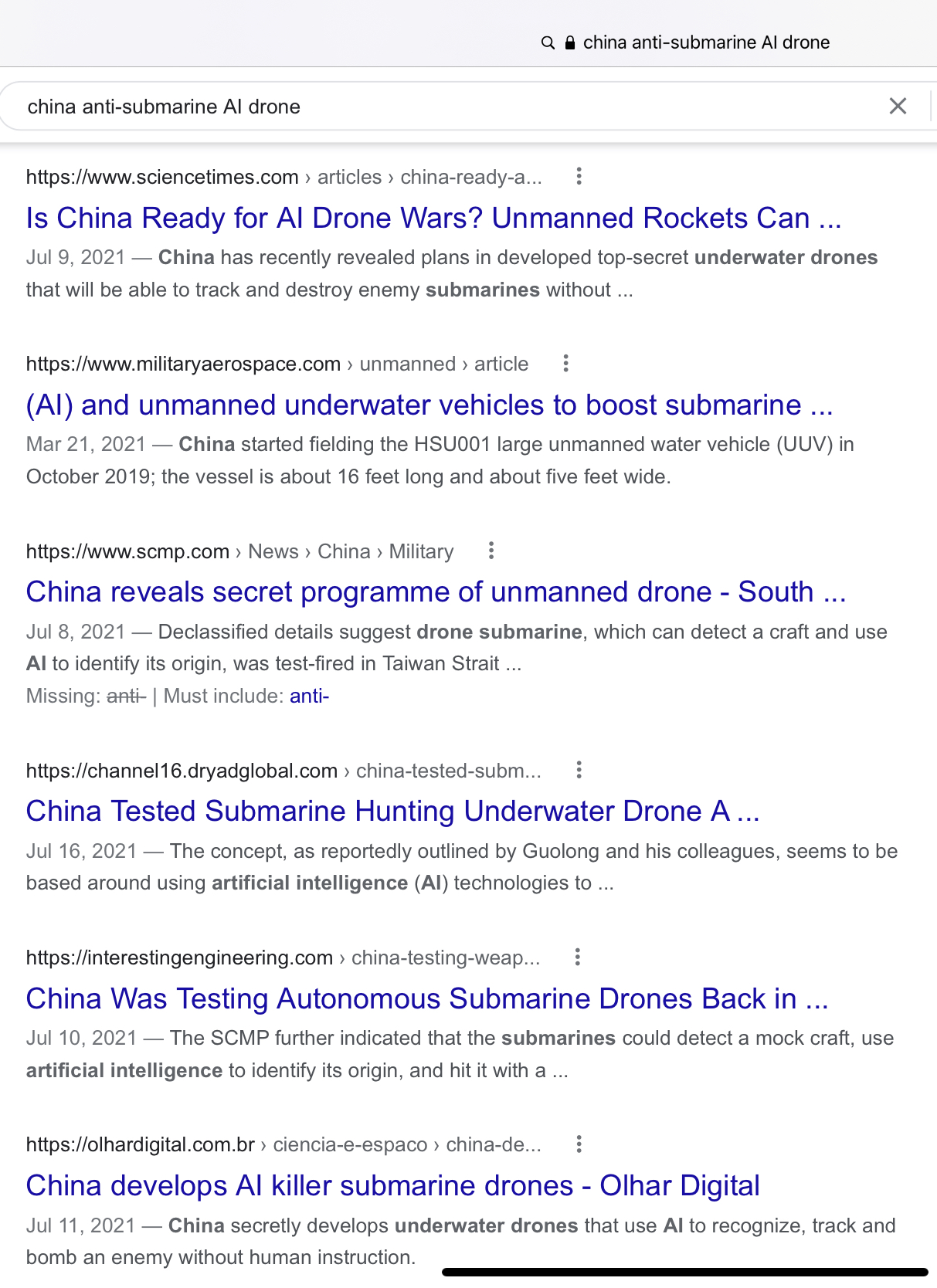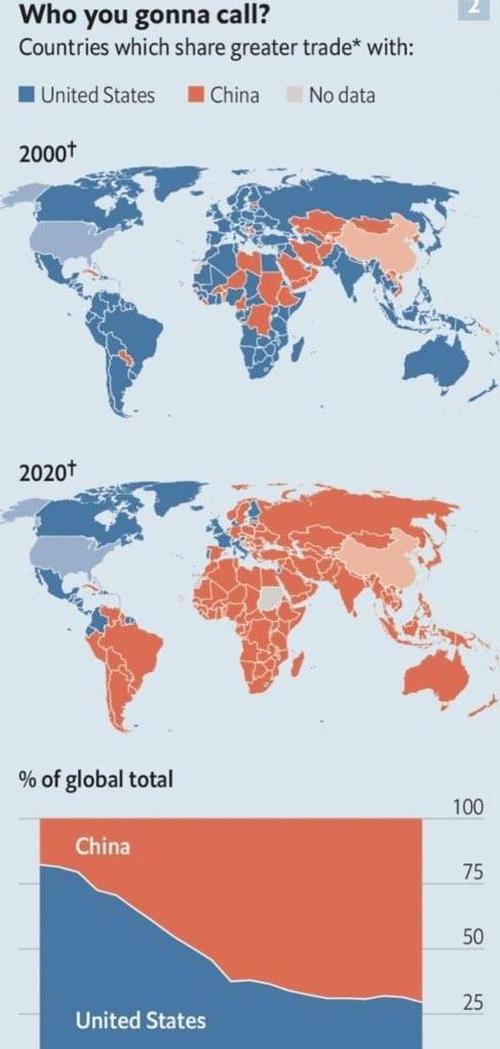Re <<Australia has joined the US and UK in an “enhanced trilateral security partnership” called AUKUS with the unspoken-yet-obvious goal of coordinating escalations against China. Antiwar reports: >>
If I understand correctly, then the Aussie ruling party government just committed ritual self-harm, because the mathematical logic is hard to escape.
UK has nothing at stake in ‘Indo-Pacific’, and will likely be harmed as it either buys nuke power plant from CCP China or from now peeved France, or unthinkably, Russia. Think UK might do better buying from China.
UK and US shall indubitably make money from Australia by selling it outdated and useless submarine technology obsoleted by Team China grid-ing of S China Sea and on out, and Team’s deployment of hypersonic anti-ship ballistic missiles (against surface fleet), air-underwater drones, persistent / autonomous / loitering anti-ship / anti-submarine quiescent call-of-duty drones, and of course given the limited number of military facilities and cities and industrial capacity on Australia island and lack of strategic depth to several kilometers of the coast, Australia can be fed to Indonesia w/ relative ease should the necessity arise, whereas Australia’s prospective contribution to any USA effort has been and shall be precisely zero, relatively speaking. Australia serves merely as a trip-wire and not a very important one, that would last a few seconds in a genuine anti-China firefight.
Unclear to me Australia thought through the spectrum of scenarios, and I pity the eventually brave submariner crew willing to duke it out, underwater, not against ships and submarines, out with the full-spectrum / flavor / genre of AI-enabled drones. Lots and lots of drones, silently waiting, and on call of anti-imperialist duty …


I trust the 26M Aussies (about 4M less than the city of Chongqin) are happy to tax-service a nuclear submarine fleet in the coming and successive elections, as well as take in quite a few Islamic fighters as burden-sharing service for the failed military adventure with the same USA / UK ‘partners’.
Team China is angling and therefore shall succeed in positioning to side-step Aussie iron ore flow per matter of time, and when so, gradually but surely, that which requires no declaration of war, exact payback for Australia signing up in league with anti-China imperial deep-state forces shall be doubly clear.
The US-UK move, OTOH, might have seriously weaken already wobbly EU stamina to remain like-minded and share an ‘Indo-Pacific’ burden that is hardly their interest. Time shall tell as the wobble fully expresses itself. Is it worth it? Who can know until we know.
In the meantime all must continue to feed the Team China industrial and therefore rejuvenation machinery. All very curious, mathematically.
Should be interesting. Below is color-coded visualization of mathematics entailed.
Bottom line, the AUKUS alliance was always there, does next to nothing, or worse than nothing, for it points Australia to self-harm, and peeve off like-minded allies. And I thought giving up Afghanistan for the simple savings of stationing a few thousand soldiers was a strategic blunder, did not realize worse blunders are possible and now happening.

Suspect NYT take of the situation does not see the future clearly, and because of the various takes, am sure Australia made a wrong but interesting call, after failing with the earlier call smh.com.au <<‘Lost the plot’: How an obsession with local jobs blew out Australia’s $90 billion submarine program>>
nytimes.com
Why Australia Bet the House on Lasting American Power in Asia
Less than three years ago, Australia’s leader said his country need not choose between the U.S. and China. A nuclear submarine deal shows that much has changed since then.
Sept. 16, 2021Updated 6:45 a.m. ET

Australia has entered an agreement with the United States and Britain to acquire nuclear-powered submarines to bolster its fleet of conventional diesel-powered vessels.Richard Wainwright/EPA, via Shutterstock
SYDNEY, Australia — When Scott Morrison became Australia’s prime minister three years ago, he insisted that the country could maintain close ties with China, its largest trading partner, while working with the United States, its main security ally.
“Australia doesn’t have to choose,” he said in one of his first foreign policy speeches.
On Thursday, Australia effectively chose. Following years of sharply deteriorating relations with Beijing, Australia announced a new defense agreement in which the United States and Britain would help it deploy nuclear-powered submarines, a major advance in Australian military strength.
With its move to acquire heavy weaponry and top-secret technology, Australia has thrown in its lot with the United States for generations to come — a “forever partnership,” in Mr. Morrison’s words. The agreement will open the way to deeper military ties and higher expectations that Australia would join any military conflict with Beijing.
It’s a big strategic bet that America will prevail in its great-power competition with China and continue to be a dominant and stabilizing force in the Pacific even as the costs increase.
“It really is a watershed moment — a defining moment for Australia and the way it thinks about its future in the Indo-Pacific region,” said Richard Maude, a former Australian security official who is now a senior fellow at the Asia Society Policy Institute.
“It does represent really quite sharp concerns now in the Morrison government about a deteriorating security environment in the region, about China’s military buildup and about China’s willingness to use coercive power to pursue national interests,” he said.

Prime Minister Scott Morrison of Australia during a news conference with Prime Minister Boris Johnson of Britain and President Biden.Mick Tsikas/EPA, via Shutterstock
Clearly, the United States also made a choice: that the need for a firm alliance to counter Beijing is so urgent that it would set aside longstanding reservations about sharing sensitive nuclear technology. Australia will become only the second country — after Britain in 1958 — to be given access to the American submarine technology, which allows for stealthier movement over longer distances.
Zhao Lijian, a spokesman for the Chinese Ministry of Foreign Affairs, said during a regular news briefing in Beijing that the submarine agreement would “seriously damage regional peace and stability, exacerbate an arms race and harm international nuclear nonproliferation efforts,” according to a transcript issued by the ministry.
“This is utterly irresponsible conduct,” Mr. Zhao said.
For the United States, the decision to bolster a close Asia-Pacific ally represents a tangible escalation of its efforts to answer China’s rapid military growth. The Defense Department said in its most recent report to Congress that China now had the largest navy in the world, measured in numbers of vessels, having built a fleet of approximately 350 ships by 2019, including a dozen nuclear submarines.
By comparison, the U.S. Navy has around 293 ships. While American vessels tend to be larger, China is also catching up with aircraft carriers while surpassing the United States with smaller, agile ships.
At the same time, China has moved aggressively to secure locations for outposts and missiles, building up its presence on islands that it constructed in the South China Sea. Security analysts believe that Australia would be likely to use nuclear-powered submarines to patrol the important shipping lanes there, in waters also claimed by Vietnam, the Philippines and Malaysia. The choice of vessel, they said, sends an unmistakable message.
“Nothing is more provocative to China than nuke stuff and submarine stuff,” said Oriana Skylar Mastro, who is a fellow at the Freeman Spogli Institute for International Studies at Stanford University and at the American Enterprise Institute. “China’s so weak in anti-submarine warfare in comparison to other capabilities.”
“To me,” said Ms. Mastro, a regular visitor to Australia, “it suggests that Australia is willing to take some real risks in its relationship to stand up to China.”

The U.S. Defense Department says China now has the largest naval fleet in the world.Pool photo by Mark Schiefelbein
American and Australian officials, seeking to douse proliferation concerns, emphasized that the submarines were nuclear-powered but had nothing to do with nuclear weapons. The promise of eight American vessels coincided with Australia’s cancellation of a contract for 12 conventional French-designed submarines that had been delayed and running over budget. French officials reacted angrily, calling the abandonment of the deal a betrayal of trust.
Speaking Thursday, Mr. Morrison said the reinforced security alliance with the United States and Britain, which will include collaborations on artificial intelligence and other emerging technology, reflected the needs of a more dangerous dynamic in the Asia-Pacific region.
“The relatively benign environment we’ve enjoyed for many decades in our region is behind us,” he said, without directly mentioning China. “We have entered a new era with new challenges for Australia and our partners.”
Some security analysts argued that China’s recent retaliation against Australia over its harder line — slashing imports of coal, wine, beef, lobsters and barley, along with detaining at least two Australian citizens of Chinese descent — appeared to have pushed Australia in the Americans’ direction. In response, China may extend its campaign of economic sanctions. Australia seems to have calculated that Beijing has little interest in improving relations.
“I think the fear of doing this would have been much more palpable even three or four years ago, maybe even two years ago,” said Euan Graham, an Asia-Pacific security analyst at the International Institute for Strategic Studies who is based in Singapore. “But once your relationship is all about punishment and flinging of insults, frankly, then that’s already priced in. China doesn’t have the leverage of fear, of being angry, because it’s angry all the time.”
A looming question, according to critics of Australia’s steadfast faith in the United States, is whether Washington will measure up. Ever since President Barack Obama announced a “pivot to Asia,” speaking before Australia’s Parliament in 2011, America’s allies have been waiting for a decisive shift in resources and attention. For the most part, they have been disappointed.
Dr. Graham said that the submarine deal would temper some of that criticism. For other allies like Japan and South Korea, he said: “It answers that question that the U.S. is still engaging in its alliance network in this part of the world.”
Still, the agreement did not erase all doubts about America’s commitment to countering China and defending its role as the dominant power in a complex region far from Washington and much closer to Beijing.
An Australian Navy vessel moored in Sydney in April.Mark Baker/Associated Press
Sam Roggeveen, director of the international security program at the Lowy Institute, a research center in Sydney, said that over the long term, the United States might decide that the contest with China is too costly, forcing some degree of power sharing and reduced influence.
“The U.S. has never faced a great power of China’s size in its history,” he said. “It has never faced down a challenger like this.”
An alternative risk is that the American pushback against China spirals into a conflict that Australia, because of its bolstered partnership, cannot avoid. The two superpowers have experienced deepening tensions over Taiwan, the self-ruled island that Beijing claims as Chinese territory. The United States says that using force to determine Taiwan’s fate would be of “grave concern,” leaving open the possibility of military intervention.
“As the U.S.-China rivalry escalates, the United States will expect Australia to do more,” said Hugh White, a defense analyst at the Australian National University and a former military official.
“If the U.S. is allowing Australia to have access to its nuclear technology,” he added, “it’s because the U.S. expects Australia to be deploying its forces in a potential war with China.”
For now, the Australian government appears to view even that risk as worth taking on. James Curran, a historian of Australian foreign relations at the University of Sydney, called the decision to double down on the United States “the biggest strategic gamble in Australian history.”
“Australia is betting its house,” he said, “on the U.S. maintaining its resolve and will.”
Sui-Lee Wee contributed reporting.
Sent from my iPad |




